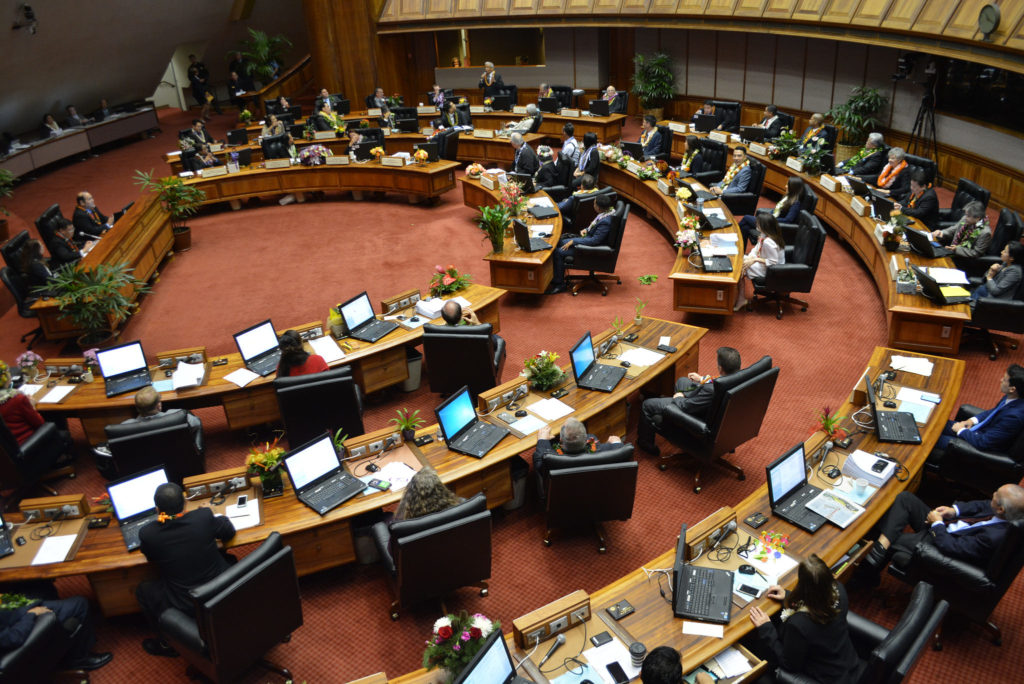Joint Economic Package Seeks to Benefit Maui County Working Families

File image of House floor. PC: Hawaiʻi House Democrats.
House Lower & Higher Education Committee Chair Justin H. Woodson said the bill package could change the lives of many of Maui’s working families for generations to come.
“These measure focus on increasing wages and providing tax benefits, investing in child care and early learning, and creating more affordable housing units. Taken together this will increase economic stability and expand the middle class,” said Representative Woodson.
Woodson said that the joint legislative bill package is in response to the issues highlighted in the Aloha United Way sponsored report, “ALICE: A Study of Financial Hardship in Hawaii.”
The ALICE (Asset Limited, Income Constrained, Employed) report describes the economic hardships facing many working individuals and families in Hawaiʻi. According to the report, after allocating monies to pay for expenses such as housing, child care, food, taxes, health care, and transportation, a family of four needs to earn roughly $77,000 a year simply to survive.
This is the first time since 2004 that a joint House and Senate legislative bill package has been introduced at the start of a session. The package also has the strong backing of the Governor and several community advocate groups.
“Being at the community level, I see it every day how people from all walks of life are just hardly making ends meet. Living paycheck to paycheck not affording housing and when someone in the family is ill it just puts limitations on the family budget and they are unable to put food on the table,” said Cesar Gaxiola, Executive Director of the J. Walter Cameron Center. “In the last few years, I have seen so many of the younger generation moved to the mainland since salaries here are not enough to cover their education nor their living expenses. I am glad to see our State officials, legislature, private sector and nonprofits in alliance to effectively deal with the circumstances and find a compromise to abet our communities.”
“I join with my Maui Senate colleagues in strong support of a holistic approach to assisting the working poor,” said Senator Rosalyn Baker (South and West Maui). “Many of these families are headed by women and apt to be in low-wage jobs. Enacting a refundable earned income tax credit, coupled with an increase in the minimum wage, will be more impactful for these single-parent households. In addition, providing greater access to public pre-school will not only give their children a learning head start, but also a home budget savings in providing childcare. This approach will be both cost effective for the State in the long run and beneficial to families as well.”
The economic package includes:
Targeting tax relief for working class families and individuals,
Increasing the minimum wage to $13 an hour by 2024,
Providing $75 million in General Obligation Bonds for the neighbor island counties to defray affordable housing infrastructure costs,
Providing tax exemptions for developers to build market priced homes,
Expanding childcare options for parents to all university sites statewide and in rural areas with limited childcare options,
Creating a new Schools Facilities Agency and allow DOE to focus on education.
Reducing Income Inequality
To put money back into the pockets of residents, one measure will provide tax relief for working families by making the Earned Income Tax Credit (EITC) refundable and permanent. That means qualified families can get a cash refund of up to $380 through this tax credit.
According to the ALICE report, minimum wage is not nearly enough to live on. This package includes a bill that will provide incremental increases in the minimum wage bringing it to $13 an hour by 2024.
“I support the strategy of addressing the challenges of our working poor in a holistic way. Our working poor—many of them single-parent households—need help with Hawaii’s high cost of living and housing. It makes sense to provide income relief with a hike in the minimum wage and making the Earned Income Tax Credit refundable, but one of the biggest costs faced by them is childcare,” said Senator Gilbert Keith-Agaran (Wailuku, Waihe‘e, Kahului). “So, accelerating public pre-school availability is a way to address child care. Finally, to get serious with getting homes built, the State and the Counties need to streamline the process for projects that are providing housing for local residents and for the State to invest in infrastructure that will reduce the costs of building those homes.”
Increasing Affordable Housing
Many in Hawaiʻi cannot afford to buy a home, especially when they have to compete with outside investors with deep pockets. To address this issue, the state will identify publicly-owned properties that can be used to develop 99-year leasehold units. Half of those homes will be reserved for working-class families earning 140 percent of the area median income (AMI).
The state will also invest $75 million in General Obligation Bonds on the neighbor islands to defray affordable housing infrastructure costs and offer a General Excise Tax exemption for projects that meet the goal of 140% AMI or below.
“This funding will directly benefit Maui residents by helping to pay for the infrastructure – the roads, sewers, utility lines – that developers need to build affordable housing,” said Representative Troy N. Hashimoto (Kahakuloa, Waihe‘e, Waiehu, Pu‘uohala, Wailuku, Waikapū). “Our residents need affordable homes.”
“This is especially important for Maui residents,” said Rep. Angus L.K. McKelvey (West Maui, Mā‘alaea, North Kīhei). “We do not have enough homes for working families and those available or too expensive or too small. I’m happy that the legislature is taking up these issues this session.”
Access to Learning for all 3- and 4-year-olds
Many families are forced to forgo child care and early learning for their children and those who do budget for child care spend about one-third of their incomes on it.
To solve this problem, this package contains a bill to create a public-private model to increase the capacity at existing private childcare facilities supported with public funds and also develop new facilities for early learning programs for 3- and 4-year-old children where they are needed.
State-owned sites in rural areas and on all the university campuses will provide space to expand the number of early learning centers.
“It is well known that students that have the benefit of early learning do better when they enter school,” said Education Chair Woodson. “All parents want what is best for their children and this proposal will help give them a better education.”
Building Educational Results
In order to allow the Department of Education to focus on its primary purpose of teaching our children, the legislature proposes to create a new Schools Facilities Agency to oversee major construction and repair projects in our schools.
The Governor will appoint an executive director for the new agency which will be responsible for all public school construction except for repair and maintenance projects that cost $100,000 or less.
“This proposal will allow the DOE to focus on teaching our children rather than construction and repair projects,” said Rep. Kyle T. Yamashita (Spreckelsville, Pukalani, Makawao, Kula, Keokea, Ulupalakua, Kahului). “This will be a great benefit for our students, parents, and teachers ”
“It’s a matter of letting the DOE focus on their primary mission for providing our students with the best education possible,” said Rep. Lynn DeCoite (Ha‘ikū, Hāna, Kaupō, Kīpahulu, Nāhiku, Pā‘ia, Kaho‘olawe, Lāna‘i, Moloka‘i, Molokini).









